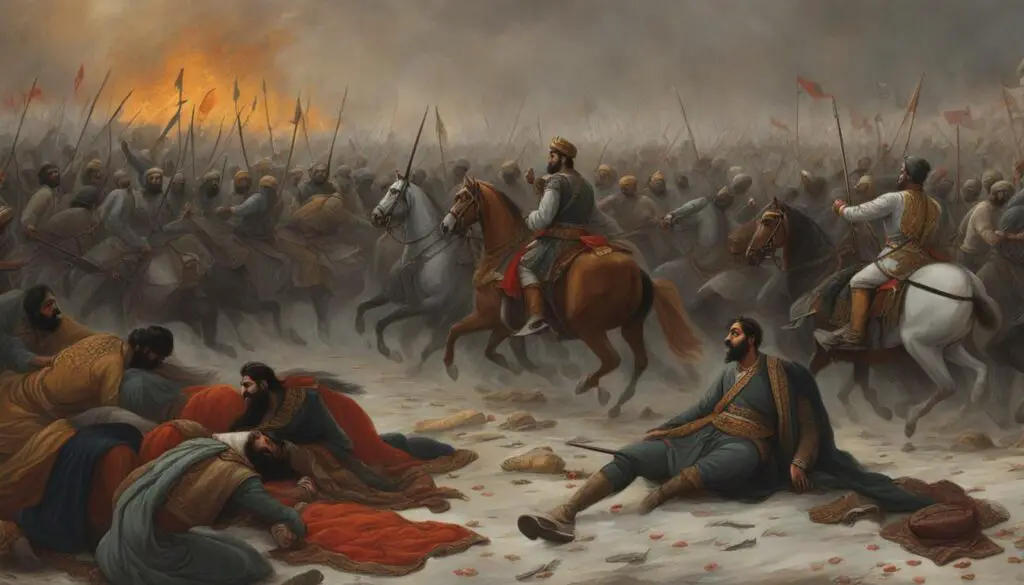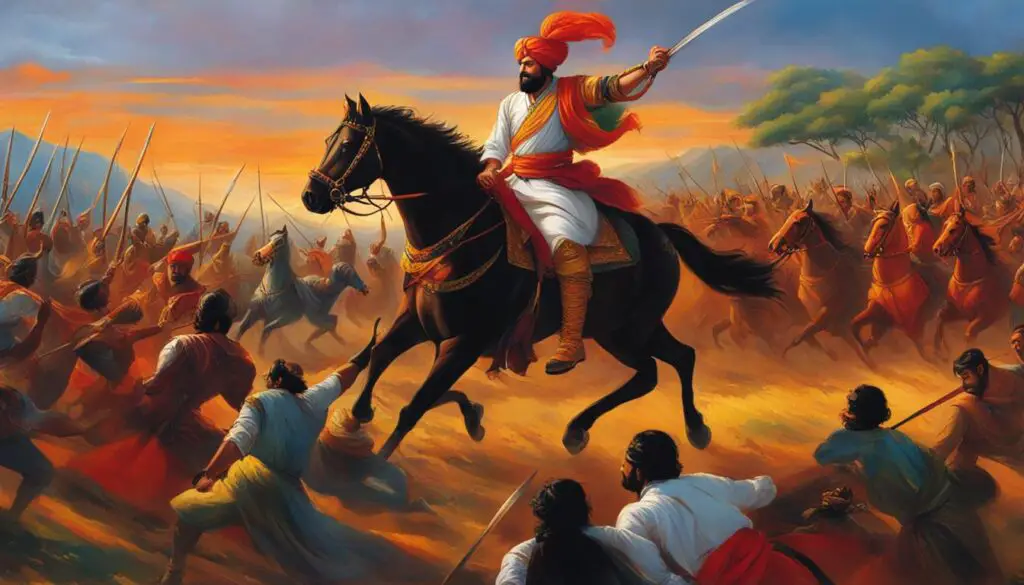Have you ever wondered about the enduring legacy of Afzal Khan in Indian history? How did one man’s encounter with Chhatrapati Shivaji Maharaj shape the course of Indian culture? Prepare to be enthralled as we dive into the captivating story of Afzal Khan’s demise and its significance in Indian history.
Afzal Khan, a 17th-century figure, holds a prominent place in Indian history. His encounter and eventual downfall at the hands of Chhatrapati Shivaji Maharaj are widely regarded as a defining moment in Indian history. Discover the untold details of this legendary encounter and the profound impact it had on Indian culture.
Key Takeaways:
- Explore the historical context of Afzal Khan’s demise and its significance in Indian history.
- Uncover the cultural significance of Afzal Khan’s story and its enduring impact on Indian folklore.
- Learn about the return of Shivaji Maharaj’s iconic weapon, the ‘wagh nakh,’ and its symbolic representation of Afzal Khan’s legacy.
- Discover the role of powadas and other artistic expressions in celebrating Afzal Khan’s defeat and Shivaji Maharaj’s heroism.
- Reflect on the indomitable spirit of the Maratha warriors and their contributions to Indian history.
The Historical Context of Afzal Khan’s Demise
Afzal Khan’s demise in 1659 occurred during a tumultuous period of political instability and power struggles in India. As the general of the Bijapur sultanate, Afzal Khan posed a formidable challenge to Chhatrapati Shivaji Maharaj, the Maratha warrior king. Their encounter has since become a defining moment in Indian history, symbolizing the downfall of a despotic ruler and the rise of a visionary leader. Various books, such as “Legends of the Marathas: The Epic Stories of 10 Great Warriors,” vividly capture the heroic exploits of Shivaji Maharaj and his battles against the Mughals and rival kingdoms, including the legendary confrontation with Afzal Khan.

“The encounter between Afzal Khan and Shivaji Maharaj is considered a pivotal moment in Indian history, as it marked the downfall of a powerful tyrant and the rise of a visionary leader.”
This historic clash between Afzal Khan and Shivaji Maharaj took place against the backdrop of a fractured India, torn between competing powers vying for supremacy. Afzal Khan, representing the Bijapur sultanate, sought to suppress the growing influence of the Marathas and maintain the status quo. On the other hand, Shivaji Maharaj, driven by a fervent desire for independence and to protect the interests of his people, challenged the might of the Bijapur sultanate and laid the foundation for the Maratha empire.
The confrontation between Afzal Khan and Shivaji Maharaj embodies the timeless struggle between oppressive forces and those fighting for freedom and justice. It encapsulates the indomitable spirit of the Marathas, who would go on to shape the course of Indian history through their unwavering determination and resilience. This significant moment serves as a testament to the legendary stature and enduring legacy of Shivaji Maharaj, a leader who continues to inspire and command admiration today.
H3: Legends of the Marathas
The tales of the Marathas have been passed down through generations, woven into the rich tapestry of Indian folklore and literary traditions. The book “Legends of the Marathas: The Epic Stories of 10 Great Warriors” provides a captivating glimpse into the lives and accomplishments of warriors like Shivaji Maharaj. It delves into the values and principles that guided these illustrious warriors and examines their impact on Indian history. Through these legends, the heroic exploits of Shivaji Maharaj and his compatriots are immortalized, ensuring that their extraordinary feats are never forgotten.
The Cultural Significance of Afzal Khan’s Demise
Afzal Khan’s demise holds great cultural significance in Indian folklore and heritage. The legendary encounter between Afzal Khan and Shivaji Maharaj has been immortalized in Marathi literature, particularly through the powada, an oral and performance-based genre of poetry.
The powada, including the famous “Afzal Khanacha Vadh,” celebrates the bravery and military genius of Shivaji Maharaj in defeating the tyrant Afzal Khan. These powadas have played a vital role in creating a shared historical memory among the Marathi-speaking population, keeping alive the heroism and victories of the Maratha warriors.
Furthermore, the recent return of Shivaji Maharaj’s iconic weapon, the ‘wagh nakh,’ from the UK to India, serves to reinforce the cultural significance of this event. The ‘wagh nakh’ symbolizes the courage and resilience of Shivaji Maharaj, representing the enduring legacy of Afzal Khan’s demise etched in the collective memory of Maharashtra.
To fully appreciate the cultural significance of Afzal Khan’s demise, consider the following:
Marathi Literature: Powadas and Storytelling
Marathi literature has long celebrated the valor and triumphs of the Maratha warriors, with powadas serving as an important medium of storytelling. These poetic compositions capture the spirit of bravery and depict the historical events surrounding Afzal Khan’s defeat. Through powadas, the cultural heritage of Maharashtra is preserved and passed down through generations.
“The powadas vividly narrate the encounter between Shivaji Maharaj and Afzal Khan, rejoicing in the victory of righteousness over tyranny. They stir our emotions and connect us to our historical roots.” – Dr. Ganesh Deshmukh, Renowned Marathi Historian
Symbolism of the ‘Wagh Nakh’
The return of Shivaji Maharaj’s ‘wagh nakh’ adds another layer of cultural significance to Afzal Khan’s demise. The ‘wagh nakh,’ meaning “tiger claws,” is a symbolic representation of the indomitable spirit of the Maratha warriors. Its return to India showcases the recognition and reverence given to the historical artifacts that embody the rich cultural heritage of Maharashtra.
“The ‘wagh nakh’ represents the triumph of good over evil, courage over fear, and justice over oppression. Its presence resonates with the pride and honor associated with Shivaji Maharaj’s historic victory.” – Dr. Shobha Deshmukh, Cultural Anthropologist
The Role of Afzal Khan’s Demise in Shaping Identity
Afzal Khan’s demise not only serves as a tale of victory but also contributes to the cultural identity of the Marathi-speaking population. The story of Shivaji Maharaj’s conquest against Afzal Khan symbolizes the resilience and determination embedded in the cultural fabric of Maharashtra. It reinforces the pride and sense of belonging that the Marathi people associate with their history and cultural heritage.
In conclusion, Afzal Khan’s demise holds deep cultural significance in Indian folklore and heritage. Through powadas and the return of Shivaji Maharaj’s ‘wagh nakh,’ the memory of this historic event lives on, inspiring generations to embrace their cultural identity and celebrate the valor of the Maratha warriors.

Conclusion
Afzal Khan’s demise and its aftermath continue to resonate through the annals of Indian history and culture. The defeat of Afzal Khan at the hands of Shivaji Maharaj is a testament to the unwavering bravery and resilience of one of India’s greatest warrior kings. This historic encounter not only shaped the destiny of the nation but also left an indelible mark on its cultural heritage.
The cultural significance of Afzal Khan’s demise is evident in the numerous powadas, books, and artistic expressions that have immortalized this momentous event. These creative works celebrate the valor and triumph of Shivaji Maharaj and the Maratha warriors, ensuring that their legacy endures through generations. Furthermore, the forthcoming return of the iconic ‘wagh nakh’ weapon to its homeland in Maharashtra adds another layer of historical importance to this tale.
The story of Afzal Khan’s demise serves as a powerful reminder of the indomitable spirit and contributions of the Maratha warriors to the rich tapestry of Indian history. It is a testament to their courage and resilience, paving the way for a united and sovereign India. The legacy of Afzal Khan and Shivaji Maharaj will forever hold a cherished place in the hearts and minds of the Indian people, their impact rippling through time and leaving an enduring cultural significance in the annals of Indian history.
FAQ
Who was Afzal Khan?
Afzal Khan was a 17th-century figure whose life and legacy continue to echo through Indian history. He was a general of the Bijapur sultanate and a formidable opponent of Chhatrapati Shivaji Maharaj, the Maratha warrior king.
What is the significance of Afzal Khan’s demise?
The encounter and ultimate downfall of Afzal Khan at the hands of Chhatrapati Shivaji Maharaj are considered a significant event in Indian history. It marked the downfall of a powerful tyrant and the rise of a visionary leader.
Are there any books that document Afzal Khan’s demise?
Yes, the story of Afzal Khan’s demise has been documented in various books, including “Afzal Khan’s Demise: The Legendary Encounter and the End of a Tyrant” and “Legends of the Marathas: The Epic Stories of 10 Great Warriors.” These books shed light on the significance of this event in shaping Indian history.
What is the ‘wagh nakh’ weapon mentioned in relation to Afzal Khan?
The ‘wagh nakh’ is the iconic weapon used by Shivaji Maharaj to kill Afzal Khan. Its return from the UK to its homeland in Maharashtra is a highly anticipated event that highlights the enduring legacy of Afzal Khan in Indian culture.
How is Afzal Khan’s demise celebrated in Indian folklore?
The story of Shivaji Maharaj’s encounter and victory over Afzal Khan has been immortalized in Marathi literature, particularly through the powada genre of poetry. Powadas like “Afzal Khanacha Vadh” celebrate Shivaji Maharaj’s bravery and military genius in defeating the tyrant Afzal Khan.
What is the cultural significance of Afzal Khan’s demise?
Afzal Khan’s demise carries immense cultural significance in Indian folklore and heritage. It is reflected in the powadas, books, and other forms of artistic expression that have captured and celebrated this historic encounter. The return of Shivaji Maharaj’s ‘wagh nakh’ further reinforces the cultural significance of this event and its impact on the collective memory of Maharashtra.
What does the story of Afzal Khan’s demise remind us of?
The story of Afzal Khan’s demise serves as a reminder of the indomitable spirit of the Maratha warriors and their contributions to the rich tapestry of Indian history. It highlights the bravery and resilience of Chhatrapati Shivaji Maharaj in shaping the destiny of India.
Source Links
- https://economictimes.com/news/india/shivajis-historic-wagh-nakh-tiger-claws-used-for-killing-afzal-khan-coming-back-to-india-from-uk/articleshow/103494942.cms
- https://shivpeth.com/afzal-khan-s-demise-the-legendary-encounter-and-the-end-of-a-tyrant
- https://thewire.in/books/powada-marathi-literature-phule

